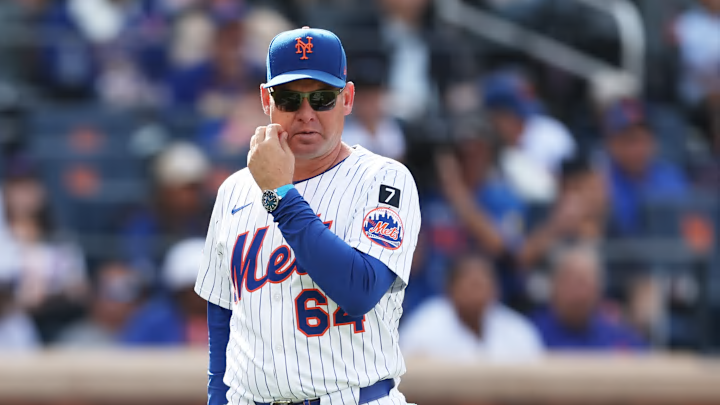In the wake of the New York Mets' shocking fall all the way out of the postseason, it's more than understandable for fans to demand change. This was the most expensive team in baseball, after all, one that responded to last year's NLCS run by adding Juan Soto in free agency. Very big things were expected, and instead what Queens got was one of the worst records in baseball since mid-June and an October at home.
And yet, the final out of New York's 4-0 loss to the Miami Marlins on Sunday — a game that the Mets just needed to win in order to snag the final NL Wild Card spot — was hardly in the glove before SNY's Andy Martino broke the news that the team had no intention of moving on from manager Carlos Mendoza this winter.
The Mets have absolutely no plans to fire Carlos Mendoza off this collapse. As they shouldn’t. Beyond that it gets interesting. Will write something this evening
— Andy Martino (@martinonyc) September 28, 2025
Well, that's certainly one way to respond to a historically awful collapse. To be clear, the blame for what happened to the 2025 Mets does not rest solely, or even mostly, on Mendoza; the holes on this roster, and particularly this pitching staff, were plain for everyone to see over the last couple weeks and months, and at a certain point it's incumbent on the players to go out and actually win games. Managers are always the quickest and most convenient place to pour out frustrations, even if they don't have all that much of an impact on what happens on the field.
But still, having said all that, it's awfully tough to square this move with what we just witnessed, for reasons that go far beyond just bad optics.
For more news and rumors, check out MLB Insider Robert Murray’s work on The Baseball Insiders podcast, subscribe to The Moonshot, our weekly MLB newsletter, and join the discord to get the inside scoop during the MLB season.
Mets' decision to keep Carlos Mendoza shouldn't come as a surprise
For starters, David Stearns more or less told us this was coming over a month ago, when he gave Mendoza a vote of confidence and telegraphed that he had no intention of making a change in the dugout. Granted, you never want to raise the specter of job security during a heated playoff chase, but Stearns' comments went far beyond your typical platitudes. Clearly, despite New York's slide having already begun, he didn't put the blame for it on his manager.
And really, why would he? The reality is that, while managers are far from unimportant, their role has changed dramatically in recent years. Even things like the day's starting pitcher and lineup construction are handled from the top down now: Mendoza no doubt has a seat at the table in those discussions, and the Mets clearly value his input and baseball knowledge, but any decisions that aren't made in-game are likely made in advance with information from Stearns and his army of assistants and analysts.
Which isn't a criticism, really; the information at teams' fingertips has exploded, and this is just the way the game is played now. It's just to say that the Mets, and 29 other MLB organizations, aren't viewing their manager as primarily a source of baseball tactics. They view them primarily as communicators, conduits between the clubhouse and front office responsible for getting a disparate group of guys all getting on board with their roles on a given day and playing as hard as possible.
The thing is, though, that you can't remove the manager's role entirely. Decisions need to be made in the heat of the moment, decisions that Stearns and Co. can't be the ones to make. And Mendoza, the man who could seemingly do no wrong during that magical late-season run a year ago, seemed to botch those decisions far too often — a trend that continued right through Game 162.
Dumping him won't fundamentally change all that much about this Mets team moving forward; the underlying philosophy and approach will remain the same. But that doesn't mean it's not the right thing to do regardless.
It's hard to argue that Mendoza wasn't a big part of the problem during Mets' collapse
Sure, Mendoza was given a bad hand in certain respects, from regression from core players like Brandon Nimmo and Mark Vientos to a pitching staff that was being held together with duct tape by the end of the year to a deeply underwhelming haul at the trade deadline. Even within those parameters, though, it's hard to understand the way he managed this team.
Above all else, Mendoza just patently refused to show the urgency required, especially once the Mets had put themselves in a position where every game was going to matter quite a bit for their playoff odds. He kept forcing players like Cedric Mullins and Ryan Helsley into key spots and refused to treat high-leverage moments with the desperation they deserved. Heck, he threw Edwin Diaz during Saturday's blowout win despite already having a huge lead, and despite knowing that he was almost certainly going to need to call upon Diaz again with the season on the line on Sunday.
And speaking of Sunday: It's all too fitting that the Mets watched their season go up in smoke with guys like Ryne Stanek on the mound, a frankly baffling decision that felt overengineered and unresponsive to the actual moment. He was pathologically incapable of projecting confidence, and his in-game decisions did not put the team in the best position to win all too often. Not overreacting to a very bad stretch of baseball when there's still plenty of reason for optimism moving forward is one thing — and yes, Mets fans, the future remains bright — but this just feels like stubbornness.
